D.C. Revolution
Washington D.C., October 2005After long continuance of bad news and worse
of grave misdeeds that multiply graves,
how levity reverses now my gaze
to see upward toward filtered inspiration
bursting in miniature beams of radiant light.
The Capital Dome seems to revolve
spinning out Libby out Rove out Cheney
and so many more of associated guilt out
into the glare of daylight their nightmare plots,
meanwhile pulling in old Rosa Parks
honored everymother with simple rightness,
with her wearied refusal to stand anymore
of the Man, the white besuited prince
of darkness, that ole devil hisself
in the guise of commonsense tradition.
Would that she were still around to sit
in that White House too, so justified.
{
excerpt from Ted Rall's op ed piece today, explaining why Bush hasn't been impeached}
~~~ ~~~ ~~~
My friend the film critic has just put down the same article I've just finished reading, a front-page blockbuster in the
New York Daily News. It says that George W. Bush knew about Karl Rove's scheme to blow CIA agent Valerie Plame's cover for years, that he was Rove's partner in treason from the start, that his claims of ignorance were lies. The
News article is anonymously sourced but we know it's 100 percent true because the White House won't deny that Bush is a traitor.
"So they'll impeach him now, right?"
My friend asked the same thing in 2001 when recounts proved Bush lost Florida, when the 9/11 fetishist admitted that he'd never even tried to catch Osama, when WMDs failed to turn up in Iraq, and when his malignant neglect killed hundreds of Americans in post-Katrina New Orleans.
"This means impeachment. Right?" Wrong.
Any one of Bush's crimes towers over the combined wickedness of Nixon and Clinton. And there are so many to choose from! How many times has Bush "made false or misleading public statements for the purpose of deceiving the people of the United States" (a key count in the Nixon impeachment)?
Stop laughing, you.

Unfortunately for my friend and the United States, impeachment is a political process, not a legal one. Nixon and Clinton faced Congresses controlled by the other party. Because Bush belongs to the same party as the majorities in the House and Senate, nothing he does can get him impeached. . . .
~~~ ~~~ ~~~
{
Rall's essay continues to explain the founding fathers' historical weak point in designing the laws covering impeachment -- at the link above}
The link above is to a feature article in the
Boston Globe that summarizes a new rejoinder from biologists to the aggressive challenges of Christian "Intelligent Design" proponents. Molecular and systems biology has not yet explained the origins of life, although scientists believe that such an explanation is within reach someday. Nevertheless the biologists do claim that
evolution itself can be better defended and explained with the latest discoveries in how genetics work. Two key notions here: "modular" building blocks that can be traced back billions of years are shared by many species; and second "complexity" is not an excuse for incomprehensible Intelligence, but rather complexity itself has an observable nature that is being studied and which helps to show how evolutionary variations are produced.
That's my point for today. If you want more, below is an excerpt. And if you still want more, see the link above. If you go further than that, get the books mentioned. Beyond that, you're on your way to training as a biologist. Let me know how you're doing with that.
~~~ ~~~ ~~~
"Organisms . . . have a far greater capacity to generate rapid and complex variations than even biologists had previously supposed. Moreover, from the genetic level up to our visible features, organisms have a modular structure. In this sense, complex features are less like singularly intricate structures than a collection of building blocks.
"Significantly, Kirschner and Gerhart write, while random genetic mutations in our DNA code cause variations, these mutations do not create random effects (a traditional working assumption of many evolutionists). Instead, all organisms have maintained an essentially intact set of vital mechanisms-metabolism, reproduction of DNA, growth mechanisms, and more-for at least 2 billion years. These elements, along with a long-conserved body plan common to many animals, serve as the platform for subsequent, often more visible variations.
"Consider the elephant's trunk, the elk's antlers, and the narwhal's tusk, which all appear to be distinct, complex innovations. But as Kirschner and Gerhart point out, the same type of cell guided their growth in each animal. Moreover, the modular structure of life means these body parts could develop without affecting the rest of the organism. (A corollary is that it only takes limited genetic changes to bring about large bodily changes.) So the trunk, antlers, and tusk are really just different expressions of the same type of genetic activity-funneled through the process of natural selection, in which variations useful to a particular environment tend to survive over time.
Kirschner and Gerhart also suggest Behe does not consider modularity in his claim that only "staggeringly complex biochemical processes" lie behind the composition of, say, an eye. As they note, the eyes of insects and mammals, each of which appear to be singularly complex, share important biochemical building blocks and connections among their components.
"People should be asking about the nature of complexity, not just how complex it is," amplifies Kirschner, in conversation. "You look at a clock, and you see that every part is purposely made. That's what you would do if you were an Intelligent Designer. But instead, when you look at biology, you find that there are very few types of parts, and they are being co-opted from one place to another. We have a Lego-like capacity to very easily generate new structures."
{article continues . . .}
"... Is it possible to have a self-organisation of scientists that is founded on the autonomy of science from power? This is no longer a concern for a small group of nuclear physicists, but for millions and millions of workers in science and technology, in administration, in education and therapy.
The pacific army of the
cognitariat holds the key to a deconstruction of the chain of automatisms through which capitalism fortifies itself."
-- conclusion to his essay, "The Warrior, the Merchant and the Sage"
BY FRANCO BIFO BERARDI
http://makeworlds.org/node/117
EHRENREICH: There is a tremendous American theme about positive thinking. We have a hard time dealing with truly bad news and discouraging information. Throughout my experience trying to get a white-collar job, I was encouraged to think positively. You are supposed to see your job loss as some great break, your chance to move on to something bigger and better. The reality is that 70 percent of people who lose their jobs and do get rehired, are rehired at a lower pay. But to criticize the system, or to be negative is considered "un-American."
It was a similar attitude that drove me crazy when I was dealing with breast cancer. Despite study after study showing there was no correlation, everyone kept telling me that my outcome would be better if I had a better attitude.
What's so offensive about that insistence, whether in relation to illness or job loss, is the implication that the victim is at fault. If you don't get better or you don't find a better job, then there must be something wrong with your attitude. The government (or the doctor, or the employer) doesn't have to take responsibility for providing for you, because if you aren't doing well, it's your fault. And of course it's an outlook that's enormously satisfying for those on top, because it implies they deserve to be there because of their winning attitudes.
~~~ ~~ ~~~
Interview continues at link above with the author who went undercover to work in the world of white collar downsizing (
Bait & Switch) and also for blue collar minimum wage servitude (
Nickel & Dimed).
These are days of bizarre dangers. . . a must read for several revelations. . . see link above . . . excerpts and summary below:" On Sept. 24, 2005, tens of thousands of protesters marched past the White House and flooded the National Mall near 17th Street and Constitution Avenue. They had arrived from all over the country for a day of speeches and concerts to protest the war in Iraq. It may have been the biggest antiwar rally since Vietnam. A light rain fell early in the day and most of the afternoon was cool and overcast.
Unknown to the crowd, biological-weapons sensors,
scattered for miles across Washington by the Department of Homeland Security, were quietly doing their work. The machines are designed to detect killer pathogens. Sometime between 10 a.m. on Sept. 24 and 10 a.m. on Sept. 25,
six of those machines sucked in trace amounts of deadly bacteria called
Francisella tularensis. The government fears it is one of six biological weapons most likely to be used against the United States.
It was an alarming reading. The biological-weapons detection system in Washington had
never set off any alarms before. There are more than 150 sensors spread across 30 of the most populated cities in America. But this was the first time that six sensors in any one place had detected a toxin at the same time. The sensors are also located miles from one another, suggesting that the pathogen was airborne and probably not limited to a local environmental source."
- [note that it took a full 6 days before a public warning was issued to medical facilities -- thanks to the efficiency of the Department of Homeland Security and the Center for Disease Control -- in other words, we are unprotected ]
- [ note also that the reporter interviewed several people who got very sick that day with symptoms similar to Tularemia and are still not recovered, including members of the highly visible activist group "Code Pink" ]
- [ note that several experts believe that this was a botched terrorism attack -- one says that you couldn't buy enough martinis to get him drunk enough to believe that this was not a deliberate bioterror attack ]
- [ note that no one has wondered which terrorist group would attack anti-war protestors! ]
- [ note that the persons behind the anthrax attacks 4 years ago are still free and unknown, thanks to the priorities of the CIA and FBI ]
Conclusion:"Currently, the investigation into what happened on Sept. 24 is ongoing. Government officials have apparently been taking soil samples around the Mall, attempting to pinpoint a natural source for
F. tularensis. In the meantime, on Oct. 5, the National Institutes of Health announced it would award two contracts worth a total of $60 million to develop new Tularemia vaccine candidates. The announcement said nothing of the events 11 days earlier."
In the July 2004 issue of the
New England Journal of Medicine Colonel Charles W. Hoge, M.D., the chief of psychiatry at Walter Reed Army Institute, published a preliminary study of the effects of the war in Iraq and Afghanistan on military personnel. The study concluded that close to 20 percent of soldiers who served in Iraq, and approximately 12 percent of those who served in Afghanistan returned home suffering from PTSD [post-traumatic stress disorder]. The study found that there is a clear correlation between combat experience and the prevalence of PTSD. The study determined that, "Rates of PTSD were significantly higher after combat duty in Iraq."
Approximately 86 percent of soldiers in Iraq were involved in combat, as were 31 percent in Afghanistan. On average, soldiers engaged in two firefights for each tour of duty.
The study indicated that 95 percent of soldiers had been shot at. And 56 percent of soldiers had killed an enemy combatant.
An estimated 28 percent were directly responsible for the death of a civilian. Equally grim, 94 percent had seen or handled corpses or bodily remains. Additionally, 68 percent witnessed fellow soldiers being killed or seriously wounded.
Although the number of soldiers suffering from PTSD is high, Dr. Hoge's study found that a majority of veterans are not seeking treatment.
Only 40 percent [!!?] of returning soldiers acknowledged that they need mental health care, and only 26 percent were actually receiving care. As such, the number of veterans approved for PTSD compensation by the VA is relatively small. Yet the VA believes that too many soldiers were approved for PTSD disability compensation and is
now seeking to deny soldiers this benefit.{rest of this article at link above}
Radical Author Dies in China
Radical Chinese Author Ba Jin Dies at 100
by Elaine Kurtenbach
{excerpt}
BEIJING (AP) —
Ba Jin, [also transliterated as "Pa Chin"] one of China's most revered communist-era writers who attacked the evils of the pre-revolutionary era in novels, short stories and essays, died Monday of cancer in Shanghai, the official Xinhua News Agency said. He was 100.
Best known for his 1931 novel "Family," the story of a disintegrating feudal household, Ba Jin also translated the Russian writers Ivan Turgenev and Pyotr Kropotkin.

He was part of the young intelligentsia in the early 20th century that looked to Western philosophies — Marxism, anarchism, and liberalism — for solutions to China's backwardness and social inequality.
Born Li Yaotang on Nov. 25, 1904, in the western city of Chengdu, he later changed his name to Ba Jin, taking the first syllable in Chinese of the surname of Mikhail
Bakunin and the last syllable of
Kropotkin, both Russian anarchists.
"Never for a moment will I put down my pen. It is kindling a fire within me," he wrote. "Even after I have been turned into ashes, my love, my feeling will not disappear from this world."
Born to a landlord's family, Ba Jin joined the Chinese anarchists as a teenager.

Ba Jin spent his early adulthood writing fiction and editing anarchist publications, and in 1936 joined the Literary Work Society, an organization of progressive young writers headed by Lu Xun. Most of Ba Jin's heroes were rebels.
In
Family, his favorite work, he portrayed tensions between feudal, patriarchal controls and rebellious youth fighting for personal and social goals.
His biographer, Olga Lang, said his works were successful as much for their social importance as their literary significance. He wrote about the restrictions he knew from his upper-class upbringing and examined the plight of workers and peasants.
Ba Jin said he wrote
"to expose enemies. They include all the old traditional concepts, the irrational systems that obstruct progress, all the forces that destroy human nature."
"Since I'm not good at speaking, I have to turn to writing to express my feelings, my love and hatred, and to let out the fire within me," he said.
Ba Jin was branded a counterrevolutionary and purged during the 1966-76 "Cultural Revolution," during which many writers and artists were persecuted and art was completely subordinated to politics. He was labeled a class enemy, banned from writing and forced to clean drains.
He did not reappear until 1977.
Later, at a time when writers were just beginning to take chances again and feel some security about their status, he complained:
"Why is it that our writing cannot be at the forefront of world literature?"
"Where else have authors in the world throughout history gone through something so terrifying and ridiculous, so bizarre and agonizing?"
Ba Jin proposed that the government create a museum to the Cultural Revolution so that later generations could learn from its horrors and avoid a repetition. The suggestion was ignored.
Snyder on Taiwan's cypress
Kisiabaton Beat-up datsun idling in the road
shreds of fog
almost-vertical hillsides drop away
huge stumps fading into mist
soft warm rain
Snaggy, forked and spreading tops, a temperate cloud-forest tree
Chamaecyparis formosiana--
Taiwan hinoki,
hung-kuai red cypress
That the tribal people call
kisiabaton this rare old tree
is what we came to see.
--Gary Snyder IX90, Ali-shan, Taiwan
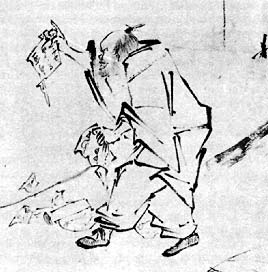
At the link above, you can find the extensive response from Mac to my "Epistle to the Christians" posted three days ago. His blog is
Doghouse Ministries. Mac kindly asked if I would in turn respond. I'm afraid that this is all I can contribute for now:
Mac:
Again thanks for your response -- which fulfills the meaning of responsibility and also of correspondent: co-responding in equal responsibility for what will have been said.
I'm very surprised to learn that you wrote all that in a 90 minute torrent of words. If you're doing that without benzedrine or gallons of caffiene, then it must be pure inspiration and preparation. I write more slowly and lose track of time. And time I don't have enough of, what with work and all the rest. (Maybe too much rest!)
I love how you brought in the bit about another bus story to complicate my bus story. That's an example of preparation and inspiration working together. And I think I should learn more about your phrase
"Depth Pluralism". Different traditions or approaches both overlap and remain unique at the same time. We shouldn't get too hung up on one or the other extreme. Christianty shares similarities and differences with Buddhism. But my further point is that Zen shares similariities and differences with Buddhism itself. You've studied enough to discover that there are so many different types of Christians and Christianities going around; much the same for Buddhism. Most people on the street remain at a very simplistic version of "faith" in most traditions. They are shocked to discover that Zen turns out to be so very different in its aims.
Some Buddhists believe that because Jesus arrived historically after the Buddha, that therefore he must have been the
Maitreya, the promised coming Buddha of the future. But this is falling into theological speculation and doctrine, to which Zen remains indifferent. What does it matter if we were to answer yes or no? We're still right back where we started as individuals. Enlightened masters on the other hand remain silent on such issues. Those who speak do not know; those who know do not speak. That much is abundantly clear when you watch the TV preachers!
Jesus occasionally sounded a lot like the Buddhist
sutras, so perhaps he'd read or heard some. They were around for about 500 years during his day, although it is doubtful that they were easily available in Palestine. If you read the excluded
"Gospel According to Saint Thomas" you get something closer to a Zen Jesus, or a least a mystical Jesus instead of just a Jewish revolutionary prophet. On other occasions, Jesus did not sound at all like anything in Buddhism, much less in Zen.
But "Depth Pluralism" resonates with the attitude of the masters. The key plurality or differences that remain are for me those issues I raised -- faith in an authority of revealed truth and tradition, vesus faith as a mode just to get you into your own spiritual illumination, after which _faith_ becomes the wrong term. And, the historical disaster of the desert religious theology. Etc.
I'm late for appointments here, so in closing I'll say that you are my kind of Christian! Stop by if you're ever in Taipei.
Harold Pinter won the Nobel Prize for Literature this year, a playwright instead of a novelist for a change. Congratulations, and it's good that he's still alive to hear the news. This prize is not awarded for aesthetic excellence (which the writer needs merely to get near the waiting room), but rather more for humanistic idealism and for political agitation in support of individual dignity. These themes are explicitly spelled out in the very definition of the award, when founded by Alfred Nobel.
But what do we talk about when we talk about idealism and agitation today? H. Pinter opposes the US and British imperial misadventure in Iraq, but that's like saying that he opposes the stealing of candy from babies. There is more, and the following quotations from Pinter begin to suggest the nature of his stinging Socratic gadfly irritation to the system:
- "The crimes of the U.S. throughout the world have been systematic, constant, clinical, remorseless, and fully documented but nobody talks about them."
- "We are in a terrible dip at the moment, a kind of abyss, because the assumption is that politics are all over. That's what the propaganda says. But I don't believe the propaganda. I believe that politics, our political consciousness and our political intelligence are not all over, because if they are, we are really doomed. I can't myself live like this. I've been told so often that I live in a free country, I'm damn well going to be free. By which I mean I'm going to retain my independence of mind and spirit, and I think that's what's obligatory upon all of us. Most political systems talk in such vague language, and it's our responsibility and our duty as citizens of our various countries to exercise acts of critical scruntiny upon that use of language. Of course, that means that one does tend to become rather unpopular. But to hell with that."
- 'In 1965, President Lyndon Johnson said to the Greek Ambassador to the US, "Fuck your Parliament and your constitution. America is an elephant. Cyprus is a flea. Greece is a flea. If these two fellows keep itching the elephant, they may just get whacked by the elephant's trunk, whacked for good..." He meant that. Two years later, the Colonels took over and the Greek people spent seven years in hell. You have to hand it to Johnson. He sometimes told the truth however brutal. Reagan tells lies. His celebrated description of Nicaragua as a "totalitarian dungeon" was a lie from every conceivable angle. It was an assertion unsupported by facts; it had no basis in reality. But it's a good vivid, resonant phrase which persuaded the unthinking...'
- "Being thrown out of the US embassy in Turkey with Arthur Miller -- a voluntary exile - was one of the proudest moments in my life."
{see anecdote here: http://www.haroldpinter.org/politics/politics_torture.shtml Pinter and Miller were told to leave by the US Ambassador because they spoke out at dinner against the US support of a regime of torture. Didn't go down well with the hors d'oeuvres.
P.S. See also link above for a related essay on Pinter versus the political cowardice of most British & American writers. The author claims that Pinter is uniquely engaged unlike the vast herd of quiet irresponsible scribblers who win prizes. This is not quite fair and certainly exaggerated, although his point ought to be considered. But Vonnegut comes to mind also because of his recent book that sounds a lot like the Pinter quotes above. Otherwise, it is true that a surprisingly large number of American writers went around supporting propaganda for the State Department with readings and anthologies, the upshot of which was to say "Don't hate us. We're good because we're multicultural and open-minded." Writers were foolish enough and naive enough to let themselves be used as mouthpieces for such utterly irrelevant distractions from the real issues of imperial abuse, foreign policy, and capitalist exploitation. But who is going to teach the writers? Certainly not the professoriate!
Grinning at his pomp
For God's sake, let us sit upon the ground
And tell sad stories of the death of kings;
How some have been deposed; some slain in war,
Some haunted by the ghosts they have deposed;
Some poison'd by their wives: some sleeping kill'd;
All murder'd: for within the hollow crown
That rounds the mortal temples of a king
Keeps Death his court and there the antic sits,
Scoffing his state and grinning at his pomp,
Allowing him a breath, a little scene,
To monarchize, be fear'd and kill with looks,
Infusing him with self and vain conceit,
As if this flesh which walls about our life,
Were brass impregnable, and humour'd thus
Comes at the last and with a little pin
Bores through his castle wall, and farewell king!
--Skakespeare,
Richard II
Epistle to the Christians
The Desert Religions and Their Shame1.1 The history of Christianity is very edifying. I recommend it. It is a vast record of shame, and especially the part set in contemporary America. Of course it wasn't
all evil any more than is any single person purely good or bad. But the good parts are surprisingly few and far between, given that the religion brands itself as "good".
1.2 The same can be said about its close cousin, Islam, which shares some 87.3% of the same theology and which historically grew out of the same desert religious tradition in that region and which draws upon the same set of myths, legends, verses, and proper names. They are both intensely concerned with personal immortality of the "Me" and with patriarchal control over the community and with a coming end-of-the-world scenario and with suppressing any competing forms of knowledge and with a God of judgment and sacrifice. That continues to be the same toxic mix it proved itself to be for over a thousand years. The proof is in the pudding. Look at the history, a history of the damned rather than the saved it would seem. And then read the headlines today. You see the same toxic mix in all its fatal results.
1.3 I am simplifying here, yes, but only to highlight the simple things that are suppressed today. We live in a time of complexity and of repressed truths: odd mixture isn't it?
1.4 The perennial combat between Islam and Christianity is explained by the fact that they are mirror images of each other: except the distortion of this funhouse mirror disturbs and makes crazy the man of faith who believes that his version is the True Original, while the mirror image is therefore a false copy, a simulacra, a mockery which threatens the very stability and Identity of belief. But they reflect each other nonetheless.
The Riddle of Faith2.1 Faith solves all sorts of existential anxieties. I'm not interested in that comfort, because I have never met anyone personally who is both a good role model and also comfortably ensconced in their faith. On the contrary, the more comfortable and confident they are, the more they injure others around them. G.W. Bush is a spectacular example, but merely one of millions. Faith is by definition to believe willingly in something that you don't know. It is to behave
as if, in the sense of pretending, and of avoiding.
2.2 The Christian faith says that you will believe if you first believe, which is of course the closed circle it sounds like. If I tell you that you will believe in me only if you first take the leap of faith and believe in me, then of course you will believe me if you believe me. That same closed circle is the one I get from the Mormons at my door telling me that their scripture is the verifiable Word of God revealed -- because the book itself says that it is! These people are not awake, much less awakened. They're like programmed robots.
2.3 Atheism is inverted faith. Two sides of the same coin. A belief versus an anti-belief, yet both taken on faith.
2.4 We all take a great deal on faith, by faith, and necessarily so. A banal example is that we take on faith what the news tells us that happened far away. A terrible earthquake in Pakistan killed 42,000 people. How do I know? E.g., sometimes weeks later the newspaper issues a correction and apology. Or I ride the bus with some faith that the driver knows where to go. As it happens, last summer in Oregon a Greyhound bus driver didn't know the way and got lost a couple of times. Sometimes our banal little faiths are demonstrated to us as merely faiths. It was my faith that hid from me the fact that we were travelling in the wrong direction for 20 minutes on a route that I otherwise knew. But these examples are banal, because they are precisely
in principle knowable by means other than faith. We can find out if we really want to. And the finding out sometimes reveals the errors of our mini-faiths. The objects of such miniature "faiths" are in principle discoverable by empirical observation or by experience or by training or by an inductive process at the least. Sometimes they encounter a correction in the form of contrary facts.
2.5 Religious faith, however, is neither miniature nor in principle discoverable by other means. It is enormous and has extensive consequences on human history. Faith hypnotizes and blinds inevitably. Skeptical inquiry halts. Progress halts. Freedom is squeezed into the narrow container of doctrine. Dissidents are thrown out as heretics, or even worse: forced in.
The Zen of Not Believing3.1 This principle distinction is also what interests me about Zen. It isn't a faith in the end, but an experience. The upshot is equally distinct: theology doesn't come into it, much less that toxic mix of the desert religions. Theology is scorned as a distraction. Faith is employed only as a temporary motivator toward getting beyond faith empirically, never as an end in itself. Moreover the "goal" itself in never ultimately attained: Zen insists that you don't stop, the practice continues, even after so-called enlightenment you must continue to develop since you're always already there yet also only half way there, and further Zen as a whole discourse doesn't stop developing, never resting assured in some final faith. It is the counter-culture of religion (above all as counter-culture to Buddhism itself), nevertheless Zen continues the universal religious concern for the anxious mysteries of life, for the wonder at life, for the suffering we each experience, for cultivating compassion and community, an attempt to heal the wounds of that community, and also for providing a path for seekers wandering away from that community. Yet Zen does so without faith in faith.
3.2 Moreover I remain a dissident even in regards to Zen, even when within Zen, which turns out to be the definitive dogma of Zen paradoxically. This is what they mean by the harsh saying, "If you meet the Buddha on the road, kill him." That isn't to advise general mayhem and violence! It advises you to remain a true dissident, avoiding the false comforts of worship and faith. False because they prevent you from going down that path you must still travel. Just because you see a God, doesn't mean that you're anywhere near home yet. You're still lost in the total animal soup of time.
3.3 What interests me still about Christianity is how it couples together a recognition of "sin" with "forgiveness" (or lets say the general and personal tendency to human weakness and error and selfishness together with the idea of love in spite of that). Despite all the religious PR work, this recognition is not copyrighted and branded by Christianity alone. (See i.e., the Buddhist emphasis on compassion and ignorance.) So my interest here is not owned and operated by a single tradition, much less a scripture or church. But Christianity certainly does have a great take on this coupling of sin and forgiveness. I tend to respect therefore the right of others to choose this faith, even to promote it. But I always keep a wary eye on their ensuing mischief, as fellow sinners who need constant forgiveness.
P.S.4.1 In other words, I forgive you for your Faith, but then I fear for the consequences too, if 2000 years can be allowed as evidence of a precedent. Perhaps forgiveness too is not finally sufficient.
Q: How are you?
A: Click here.

Marine Explains Violence
Ex-Marine's book lashes out at US troop trainingAFP , PARIS
US military training has created troops so desensitized to violence that battleground brutality in Iraq is rampant -- and has helped fuel the bloody insurgency seen there today, a new book released yesterday in France by a former Marine says.
Jimmy Massey, a former staff sergeant, said that the daily attacks now doled out to US-led forces and Iraqi civilians are "because of the brutality that the Iraqi people saw at the start of the invasion."
In his book,
Kill! Kill! Kill!, he says he and other Marines in his unit killed dozens of unarmed Iraqi civilians because of an exaggerated sense of threat, and that they often experienced sexual-type thrills doing so.
The book was being released first in France -- and in French -- because, he said, "I didn't find an American publisher."
Natasha Saulnier, the French journalist who helped Massey write the book, said she believed the US companies were reluctant to touch it because its "controversial" nature threatened commercial interests and the US public's image of their fighting forces.
Massey, who left Iraq in May 2003 shortly after US President George W. Bush declared "mission accomplished," wrote the book after being discharged from the Marines with a diagnosed case of post-trauma stress syndrome.
"It's been a healing experience," he said. "It's allowed me to close a lot of chapters and answer a lot of questions."
In the book, he claims he and a group of Marines were near Baghdad when a group of 10 Iraqi men started to protest near them, yelling out anti-US slogans. At the sound of a gunshot, he said he and his men fired on the group, killing most of them, only to find out later that none of them was armed.
He also recounts several episodes at checkpoints where civilian cars failed to stop and their unarmed occupants were shot to death.
At one point he says he told an officer that the US military campaign "resembles a genocide" and that "our only objective in Iraq is petrol and profits."
{excerpts from ...}
Experts: Future of Big Hurricanes Looms
By JOSEPH B. VERRENGIA, Associated Press Writer
Have we seen America's future through the eyes of hurricanes Katrina and Rita? Monster storms drowning cities and obliterating coastlines. Jobs vanishing and prices rising as ports and pipelines close. Millions fleeing, but many are trapped and die. Chaos reigns, paralyzing government and leaving the world's wealthiest society humbled and frightened.
Natural disaster in the United States has morphed to a dangerous new level. Some experts say the nation can expect to be pummeled by more of these mega-catastrophes over the next 20 or 30 years in a nasty conspiracy of unfavorable weather patterns, changing demographics and political denial.
. . . .
"Are we prepared to lose a major city every year?" asks Carnegie Mellon University risk strategist Baruch Fischhoff. "It's cowardice not to ask the question, and cowardice on the public's part not to get engaged in the answer."
"We failed quite significantly," says sociologist Havidan Rodriguez, director of the Disaster Research Center at the University of Delaware. "Will what we've seen over the last few weeks continue to be the case? It could unless we prepare. People tend to forget lessons learned. Governments tend to forget." . . . .
[Conclusion: ]
History is littered with the bones of great cities built in defiance of nature, most prominently the ancient version of Alexandria, Egypt, and its great library and lighthouse. That was another city built in the squishy mouth of a great river. Two millennia later, some truths don't change, said Muir-Woods, who raised the comparison with New Orleans.
"Climate change will have its greatest impact at the coastlines," Muir-Woods said, "and the risk will go up higher than people think."

This week yet another in a long series of hundreds of village protests in rural China, which generally pit farming villagers versus corrupt officials in league with private industries.
The
Taipei Times caption for this photo is:
"Chinese riot police block villagers at Taishi village in Guangdong Province on Sept. 12. Several villagers were injured when they tried to prevent police officers from seizing accounting ledgers that they said contain evidence of graft by the village chief." (PHOTO: AP)
The lawyer defending the rights of the villagers was arrested. He's in a deep pile of crap now. The police force here came out with overwhelming force because the police have been defeated by villagers in the past. The historical trend behind all this is the brutal transition from a socialist society to a capitalist economy, where a few lucky insiders are taking property while most of the population is shoved aside and told to survive elsewhere. This process is pushed along by the authoritarian regime in power, ironically named the "Communist Party".
More on this story at the link above.
And what's up with the names of political parties in general now? All over the world we find misnomers, such as in the US "Republican" party which turns out to be the party of "Empire" and Theocracy instead.
Excerpts from Al Gore's recent speech criticizing how TV news destroys public reasoning below. Gore also describes projects to restore a functioning public sphere of democratic discussion. "It is no longer possible to ignore the strangeness of our public discourse ... I know that I am not the only one who feels that something has gone basically and badly wrong in the way America's fabled "marketplace of ideas" now functions.
"How many of you, I wonder, have heard a friend or a family member in the last few years remark that it's almost as if America has entered "an alternate universe?"
"I thought maybe it was an aberration when three-quarters of Americans said they believed that Saddam Hussein was responsible for attacking us on September 11, 2001. But more than four years later, between a third and a half still believe Saddam was personally responsible for planning and supporting the attack.
. . . .
"Are we still routinely torturing helpless prisoners, and if so, does it feel right that we as American citizens are not outraged by the practice? And does it feel right to have no ongoing discussion of whether or not this abhorrent, medieval behavior is being carried out in the name of the American people? If the gap between rich and poor is widening steadily and economic stress is mounting for low-income families, why do we seem increasingly apathetic and lethargic in our role as citizens?"
[
Gore then summarizes the forgotten basics of how the 18th century Enlightenment devised a democratic public sphere: ]
- It was open to every individual, with no barriers to entry, save the necessity of literacy. This access, it is crucial to add, applied not only to the receipt of information but also to the ability to contribute information directly into the flow of ideas that was available to all.
- The fate of ideas contributed by individuals depended, for the most part, on an emergent Meritocracy of Ideas. Those judged by the market to be good rose to the top, regardless of the wealth or class of the individual responsible for them.
- The accepted rules of discourse presumed that the participants were all governed by an unspoken duty to search for general agreement. That is what a "Conversation of Democracy" is all about.
~~~ ~~~ ~~~
{ We live in a neo -Dark Ages when such basics have been forgotten. Meanwhile, Gore himself should read a now aging classic of scholarship by
Habermas:
The Structural Transformation of the Public Sphere. If you happen to know his address, please send this to him. Habermas gives a dialectical analysis of how "the market" then also led to the decline and fall of that public sphere of open information and debate. The 18th century "Republic of Letters" was killed off by the rise of mass media as business and the manufacture of public opinion by marketing experts, or the kind of thing that Gore goes on to describe by naming names in today's American version. Gore did refer to Habermas in his speech, but only a remark from a more recent statement:
"The German philosopher, Jurgen Habermas, describes what has happened as "the refeudalization of the public sphere." That may sound like gobbledygook, but it's a phrase that packs a lot of meaning. The feudal system which thrived before the printing press democratized knowledge and made the idea of America thinkable, was a system in which wealth and power were intimately intertwined, and where knowledge played no mediating role whatsoever. The great mass of the people were ignorant. And their powerlessness was born of their ignorance."
Gore is a centrist democrat who seems to call for a return to government regulation of mass media and the Internet in order to assure fairness and "balance" and access, sustained by the ideal of merit rather than money. While this would greatly improve upon today's media climate of sensationalism and propaganda, still it seems, well, a typically "liberal" compromise with the worst white collar avarice that has led American into its present morass. It's OK as far as it goes, but probably not far enough. He also announces forthcoming experimental projects to support the democratization of media, so we'll have to see what comes of that. Gore's speech continues at the link above, and it is like an alarm clock going off at dark-thirty in the morning to be reminded that President Bush's speeches are so childish and embarrassing in comparison . . . }
"
It is a commonplace that the significance of a work of art changes as it survives. Usually however, this knowledge is used to distinguish between 'them' (in the past) and 'us' (now). There is a tendency to picture
them and their reactions to art as being embedded in history, and at the same time to credit
ourselves with an over-view, looking across from what we treat as the summit of history. The surviving work of art then seems to confirm our superior position. The aim of its survival was us.
"This is illusion. There is no exemption from history. The first time I saw the Grünewald [
Isenheim Altarpiece ] I was anxious to place
it historically. In terms of medieval religion, the plague, medicine, the Lazar house. Now I have been forced to place myself historically.
"In a period of revolutionary expectation [1968] I saw a work of art which had survived as evidence of the past's despair; in a period which has to be endured, I see the same work miraculously offering a narrow pass across despair."
-- John Berger,
About Looking
Perhaps it doesn't go without saying that I'm applying this statement to the previous blog entries about the Left Bank images.
Debord on the Left Bank

Here's an excerpt from a biography of Guy Debord titled
The Game of War, by Andrew Hussey: "It was the privilege of the group at Chez Moineau that, in the words of Vali, 'we lived like a pack of bastard dogs'. By this Vali meant, quite simply, that much of their time was spent avoiding police raids, living without papers, scrounging money, chasing drugs. However, in the photographs taken by Van der Elsken, as he himself puts it, the description takes on a more powerful resonance: the youth of Chez Moineau were vagabonds who were 'passive, dark, melancholy'; as they had nothing of the fey allure of the gilded youth who fluttered around Sartre at Cafe de Flore or Les Deux Magots; their faces were tight, impassive, frozen in space and time. They were, he says, a future generation whose youth had marked them forever.
. . . .
"Guy Debord was extremely protective of the closed world of Chez Moineau. He never mentioned in his letters home the nature of the crowd he had fallen in with and was careful to describe his activities in the most circumspect manner. Having abandoned Cannes, family and, as he saw it then, all prospect of making a respectable way in the world, the cloistered environment of the Letterist headquarters at Chez Moineau provided Debord with the language and style of negation."
. . . .
"Although Debord and the other regulars at Chez Moineau had initially been amused by the attention given by the French and then the international press to youth activities on the Left Bank, they were soon bored and disgusted by the way in which the spontaneous life of the Left Bank had become a staple of lifestyle magazine articles. . . ." (pp 55-56).
{They would soon strike back, in 1952 disrupting a film festival for excluding Letterist films, and next with a contstructed "situation" in which they drove a theater audience to crazed outrage by showing Debord's avant-garde film
Howling in Favor of Sade.}
These photos document a now vanished moment in Paris, circa 1951 to 1953 in the cafes of the Left Bank around Saint Germain des Prés. They were taken by the late Ed Van Der Elsken, then visiting from Amsterdam only to find himself drawn into a small tribe of young bohemian delinquent anarchists -- and to fall passionately in love with them. Some of these photos have never been published, while others are available in his book,
Love on the Left Bank, as I noted in my previous blog post. They are available from the archives of the Netherlands Photo Museum at the link above.
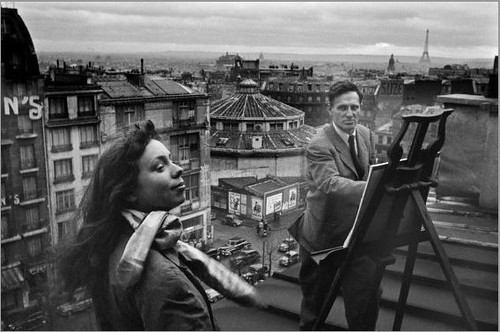
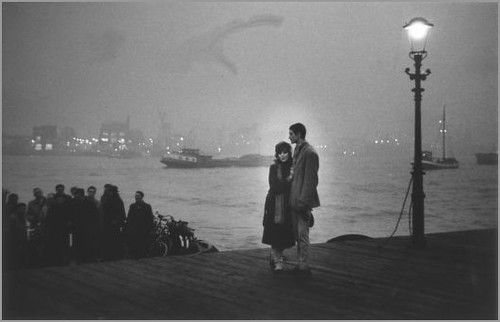
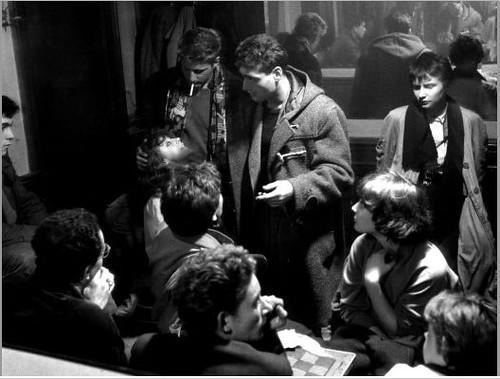
Café Chez Moineau Rue du Four, Paris, France (1953). A few young rebels, a couple of members of the Letterist International.
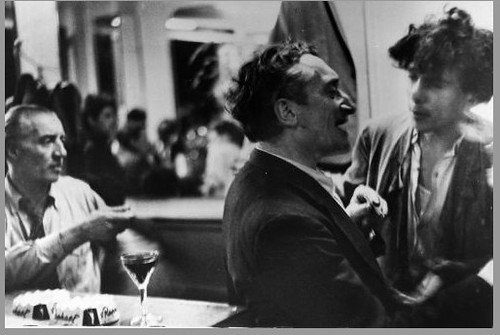
Inter-generational philosophy slams.
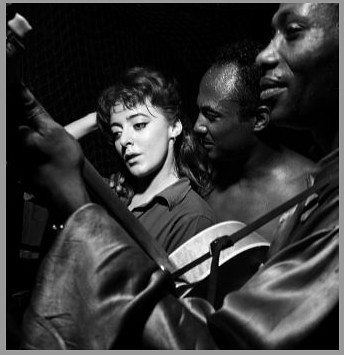
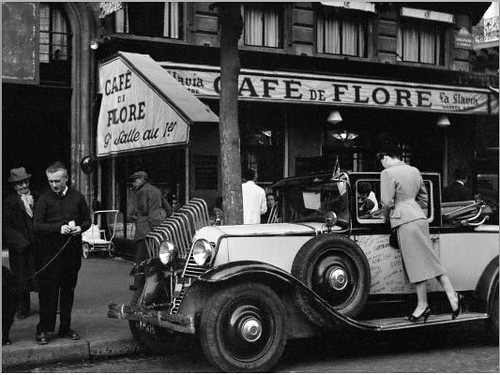
Next bloggence will treat the memoirs of these images, to evoke the exact milieu of the young Guy Debord amoung the Letterists and soon to be Situationist avant-garde.
Vagrants on the Left Bank

Vali Myers on the Left Bank, mid 1950s.
"They were rootless children come from every corner of Europe. Many had no home, no parents, no papers. For the cops, their legal status was "vagrant". Which is why they all ended up sooner or later in La Sante prison.
"We lived in the streets, in the cafes, like a pack of mongrel dogs. We had our very own codes. Students and people with jobs were kept out. As for the tourists who came around to gawk at "existentialists," it was all right to con them. We always managed to have rough wine and hash from Algeria. We shared everything."
-- the late Vali Myers, artist
{quoted in
The Tribe by Jean-Michel Mension. Photo by Ed Van der Elsken, first famous in the 1950's for the book of photos,
Love on the Left Bank }
Agamben & Post-Proletarians
DesoeuvrementChapter 19 from Giorgio Agamben’s The Open: Man & Animal
Translated from the Italian by Kevin Attell.
In the Kunsthistorisches Museum of Vienna there is a late work by Titian (defined by some, indeed, as his ultima poesia, something of a farewell to painting) known as the Nymph and Shepherd.

The two figures are represented in the foreground, immersed in a dark country landscape; the shepherd, seated facing us, holds a flute in his hands as if he had just taken it from his lips. The nymph, nude and represented from the back, lies stretched next to him on a leopard’s skin, a traditional symbol for wantonness and libido, showing her full and luminous hips. With a studied gesture, she turns her pensive face toward the viewers, and with her left hand lightly touches her other arm in a sort of caress. A little further in the distance, there is a tree that has been struck by lightening, half dry and half green, like the tree in the allegory of Lot, against which an animal – a “bold goat” according to some, but perhaps a fawn – dramatically rears up, as if to nibble at its leaves. Still higher, as is often the case in the late, impressionist Titian, one’s gaze becomes lost in a vivid mass of painting.
Faced with this enigmatic paysage moralise immersed in an atmosphere of both exhausted sensuality and subdued melancholy, scholars have been left perplexed, and no explanation has seemed complete. To be sure, the scene is “too much fraught with emotion to be an allegory,” and yet “this emotion is too restrained and somber for any of the suggestions proposed” (Panofsky, Erwin. Problems in Titian, Mostly Iconographic). It seems obvious that the nymph and the shepherd are linked erotically; but their relationship, at once promiscuous and remote, is so peculiar that they must be “despondent lovers, so near to each other in body yet so far apart in sentinment” (Panofsky). And everything in the painting -- the nearly monochromatic tone of the colors, the dark and brooding expression of the woman, as well as her pose – “suggests that this couple have eaten from the Tree of Knowledge and that they are losing their Eden” (Dundas, Judith. “A Titian Enigma” in Artibus et Historiae 12, 1985).
The relation of this painting to another by Titian, The Three Ages of Man, in the National Gallery of Scotland in Edinburgh, has been rightly observed by Judith Dundas. According to the scholar, the painting in Vienna – done many years later – takes up several of the elements of the earlier work (the pair of lovers, the flute, the dry tree, and the presence of an animal, probably the same one), but presents them in a darker, more despairing key which no longer has anything in common with the crystalline serenity of the Three Ages.

But the relation between the two canvases is, however, much more complex than this, and one is led to think that Titian has intentionally returned to the work from his younger years, and in a further investigation of their common erotic theme has recanted the earlier work point for point (in the Edinburgh painting – as attested to by the presence of the Erota and dry tree – the iconographic theme of the “three ages of man” is also treated in the form of a meditation on love). First of all, the figures of the two lovers are inverted; for in the earlier work, the man is nude and the woman clothed. She, who is represented not from behind but in profile, here holds the flute which will pass into the hands of the shepherd in the Vienna painting. In the Three Ages we also find, on the right, the shattered and dry tree – symbol of knowledge and of sin – on which an Eros is leaning; but when taking the motif up again in the late work, Titian has it blooming on one side, thus bringing together in a single trunk the two Edenic trees, the Tree of Life and the Tree of Knowledge of Good and Evil. And while in the Three Ages the fawn is tranquilly stretched on the grass, it now takes place of Eros and rises up the Tree of Life.
The enigma of the sexual relationship between the man and the woman, which was already at the center of the first painting, thus receives a new and more mature formulation. Sensual pleasure and love – as the half-bloomed tree bears witness – do not prefigure only death and sin. To be sure, in their fulfillment the lovers learn something of each other that they should not have known – they have lost their mystery – and yet have not become any less impenetrable. But in this mutual disenchantment from their secret, they enter, just as in Benjamin’s aphorism, a new and more blessed life, one that is neither animal nor human.
It is not nature that is reached in their fulfillment, but rather (as symbolized by the animal that rears up the Tree of Life and of Knowledge) a higher stage beyond both nature and knowledge, beyond both concealment and disconcealment. These lovers have initiated each other into their own lack of mystery as their most intimate secret; they mutually forgive each other and expose their vanitas. Bare or clothed, they are no longer either concealed or unconcealed – but rather, inapparent {inapparenti}. As is clear from both the posture of the two lovers and the flute taken from the lips, their condition is otium {leisure}, it is workless {senz’opera}. If it is true, as Dundas writes, that in these paintings Titian has created “a realm in which to reflect on the relationship between body and spirit,” in the Vienna painting this relationship is, so to speak, neutralized. In their fulfillment, the lovers who have lost their mystery contemplate a human nature rendered perfectly inoperative – the inactivity inoperosita} and desoeuvrement of the human and animal as the supreme and unsavable figure of life.
~~~ ~~~ ~~~ { Agamben here moves beyond Nietzsche’s strenuous “beyond Good & Evil” and also beyond Derrida’s convoluted point about human shame at being observed nude by an animal. He gives new meaning to the old term “idyll”, which this entire iconography gestures toward much more than to vanitas. Here the lovers passively lollygagging in their fulfillment beyond shame and beyond ambition and beyond mystery are the very icon of a postmodern potential. The title of this chapter, is a French coinage that bears the connotation of de-proletarian-ization, a peaceful rest from the relentless industry of our era, beyond exchange value. If the deep history of western humanism and political theory has been founded upon a humanity-as-producer, then here in an idyll from that history, an interlude of idle resignation, of illuminated disillusionment. Yet it is this same passive closure that paradoxically opens toward a blessed status. }



 At the link above, you can find the extensive response from Mac to my "Epistle to the Christians" posted three days ago. His blog is Doghouse Ministries. Mac kindly asked if I would in turn respond. I'm afraid that this is all I can contribute for now:
At the link above, you can find the extensive response from Mac to my "Epistle to the Christians" posted three days ago. His blog is Doghouse Ministries. Mac kindly asked if I would in turn respond. I'm afraid that this is all I can contribute for now:













